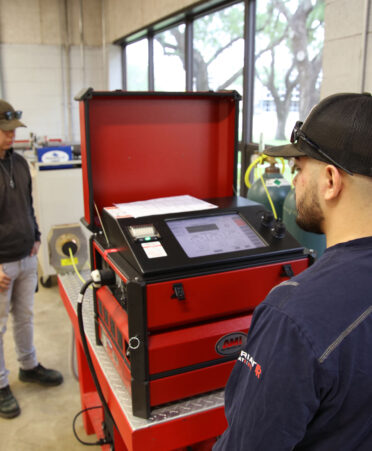(HARLINGEN, Texas) – National Welding Month, which is observed each April, is a good time to showcase how current automation technology in Texas State Technical College’s Welding Technology program is preparing students for careers in the manufacturing field.
The orbital tube welding machine and the robotic welding arm cell are types of welding automation that are designed to increase speed, precision and quality, and minimize inconsistent welds.
TSTC Welding Technology instructor Kenneth Moore, who has worked in the program for 20 years, has trained students for 10 years with the orbital tube welding machine and for three years with the robotic welding arm cell.
Moore said learning current automated technology means increased job opportunities.
“The program’s welding automation training is one semester or 15 weeks,” he said. “The education gives students more chances to advance in the ever-changing landscape of the welding industry. Some of the industries that orbital tube welding serves include food and beverage processing, biopharmaceutical processing, semiconductor manufacturing, industrial gas distribution, instrumentation, and aerospace aviation. The industries that serve robotic welding processes are manufacturing, oil and gas, construction, aerospace and defense.”
Claired Ruiz, who works for Kiewit Corp. in Ingleside, graduated from the program last year.
“There is only one robotic welding arm cell at Kiewit, and I’m the woman who is operating it,” she said. “The technology helps produce products at a faster rate in comparison to that of a human doing it hands-on.”
Alexander Alvarez, who is studying for an Associate of Applied Science degree, said automation has taught him a different aspect of welding.
“I was curious how such clean welds existed based on what I saw on social media,” he said. “I learned that it was done by automation or machines. Now I’m learning that in the Welding program. Now it’s a possible career option after I graduate in August.”
The Harlingen resident said that welding automation has motivated him to learn more.
“The best part is that it’s indoors, the work is clean, and you have an understanding of your materials and equipment,” he said. “Mr. Moore does a great job at explaining so we comprehend.”
Caleb Garza, of Harlingen, is also studying for an Associate of Applied Science degree in the program. He said programming the automation equipment has been enjoyable.
“While learning this technology, you can input the parameters so that the machine can perform the weld and you take a step back,” he said. “Learning this is still essential for the industry, but I still enjoy the hands-on approach to completing the assignments.”
National Welding Month celebrates welders for their contributions to industries such as automotive, construction and manufacturing.
According to onetonline.org, welders, cutters, solderers and brazers can earn a yearly median salary of more than $47,000 in Texas. These jobs are expected to increase in the state by 23% between 2020 and 2030, according to the website.
TSTC offers Welding Technology at each of its 10 campuses located throughout Texas.
Welding Technology is one of nine programs at TSTC that have money-back guarantees. The college’s commitment to participating students is simple: If they do not have a job in their field within six months of graduation, they will receive a full refund of their tuition. For more information on the Money-Back Guarantee program, visit https://www.tstc.edu/admissions/tuition/.
For more information about TSTC, visit tstc.edu.
